In 2016, KrebsOnSecurity exposed a network of phony Web sites and fake online reviews that funneled those seeking help for drug and alcohol addiction toward rehab centers that were secretly affiliated with the Church of Scientology. Not long after the story ran, that network of bogus reviews disappeared from the Web. Over the past few months, however, the same prolific purveyor of these phantom sites and reviews appears to be back at it again, enlisting the help of Internet users and paying people $25-$35 for each fake listing.
Sometime in March 2018, ads began appearing on Craigslist promoting part-time “social media assistant” jobs, in which interested applicants are directed to sign up for positions at seorehabs[dot]com. This site promotes itself as “leaders in addiction recovery consulting,” explaining that assistants can earn a minimum of $25 just for creating individual Google for Business listings tied to a few dozen generic-sounding addiction recovery center names, such as “Integra Addiction Center,” and “First Exit Recovery.”
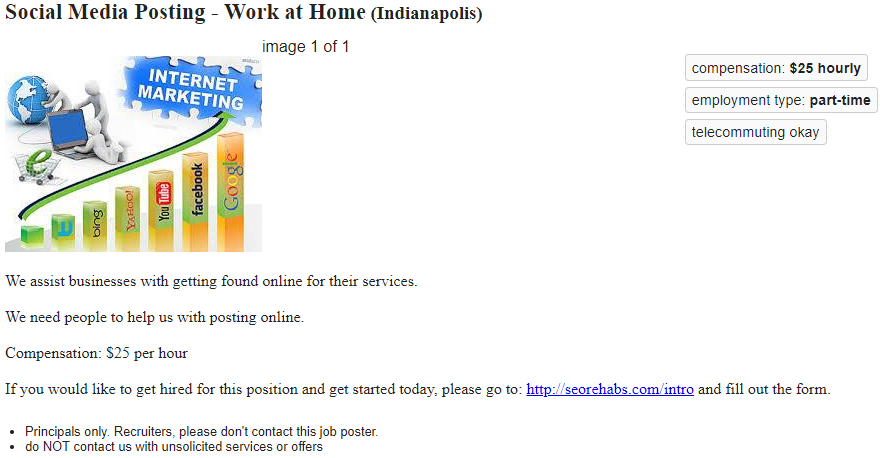
The listing on Craigslist.com advertising jobs for creating fake online businesses tied to addiction rehabilitation centers.
Applicants who sign up are given detailed instructions on how to step through Google’s anti-abuse process for creating listings, which include receiving a postcard via snail mail from Google that contains a PIN which needs to be entered at Google’s site before a listing can be created.
Assistants are cautioned not to create more than two listings per street address, but otherwise to use any U.S.-based street address and to leave blank the phone number and Web site for the new business listing.
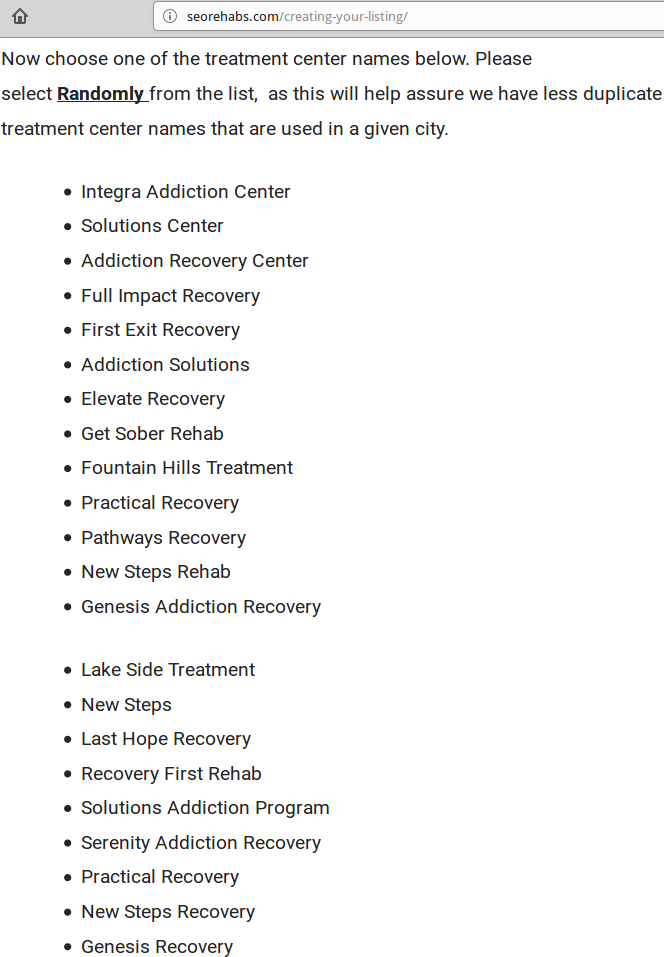
A screen shot from Seorehabs’ instructions for those hired to create rehab center listings.
In my story Scientology Seeks Captive Converts Via Google Maps, Drug Rehab Centers, I showed how a labyrinthine network of fake online reviews that steered Internet searches toward rehab centers funded by Scientology adherents was set up by TopSeek Inc., which bills itself as a collection of “local marketing experts.” According to LinkedIn, TopSeek is owned by John Harvey, an individual (or alias) who lists his address variously as Sacramento, Calif. and Hawaii.
Although the current Web site registration records from registrar giant Godaddy obscure the information for the current owner of seorehabs[dot]com, a historic WHOIS search via DomainTools shows the site was also registered by John Harvey and TopSeek in 2015. Mr. Harvey did not respond to requests for comment. [Full disclosure: DomainTools previously was an advertiser on KrebsOnSecurity].
TopSeek’s Web site says it works with several clients, but most especially Narconon International — an organization that promotes the rather unorthodox theories of Scientology founder L. Ron Hubbard regarding substance abuse treatment and addiction.
As described in Narconon’s Wikipedia entry, Narconon facilities are known not only for attempting to win over new converts to Scientology, but also for treating all substance abuse addictions with a rather bizarre cocktail consisting mainly of vitamins and long hours in extremely hot saunas. Their Wiki entry documents multiple cases of accidental deaths at Narconon facilities, where some addicts reportedly died from overdoses of vitamins or neglect.
A LUCRATIVE RACKET
Bryan Seely, a security expert who has written extensively about the use of fake search listings to conduct online bait-and-switch scams, said the purpose of sites like those that Seorehabs pays people to create is to funnel calls to a handful of switchboards that then sell the leads to rehab centers that have agreed to pay for them. Many rehab facilities will pay hundreds of dollars for leads that may ultimately lead to a new patient. After all, Seely said, some facilities can then turn around and bill insurance providers for thousands of dollars per patient.
Perhaps best known for a stunt in which he used fake Google Maps listings to intercept calls destined for the FBI and U.S. Secret Service, Seely has learned a thing or two about this industry: Until 2011, he worked for an SEO firm that helped to develop and spread some of the same fake online reviews that he is now helping to clean up.
“Mr. Harvey and TopSeek are crowdsourcing the data input for these fake rehab centers,” Seely said. “The phone numbers all go to just a few dedicated call centers, and it’s not hard to see why. The money is good in this game. He sells a call for $50-$100 at a minimum, and the call center then tries to sell that lead to a treatment facility that has agreed to buy leads. Each lead can be worth $5,000 to $10,000 for a patient who has good health insurance and signs up.”
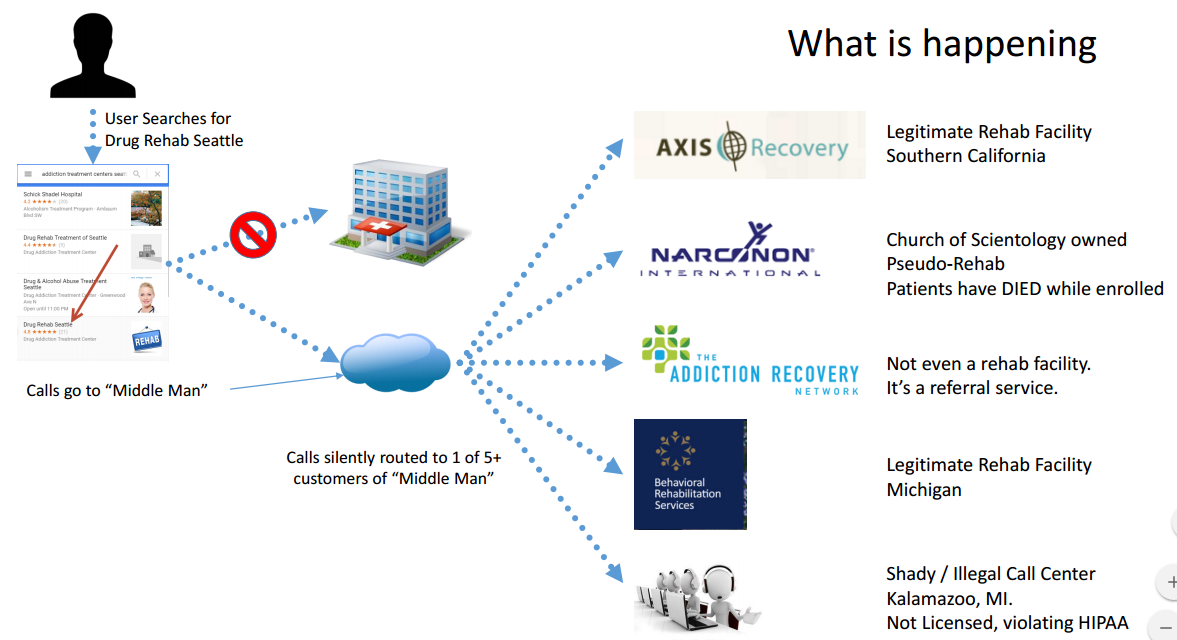
This graph illustrates what happens when someone calls one of these Seorehabs listings. Source: Bryan Seely.
Many of the listings created by Seorehab assistants are tied to fake Google Maps entries that include phony reviews for bogus treatment centers. In the event those listings get suspended by Google, Seorehab offers detailed instructions on how assistants can delete and re-submit listings.
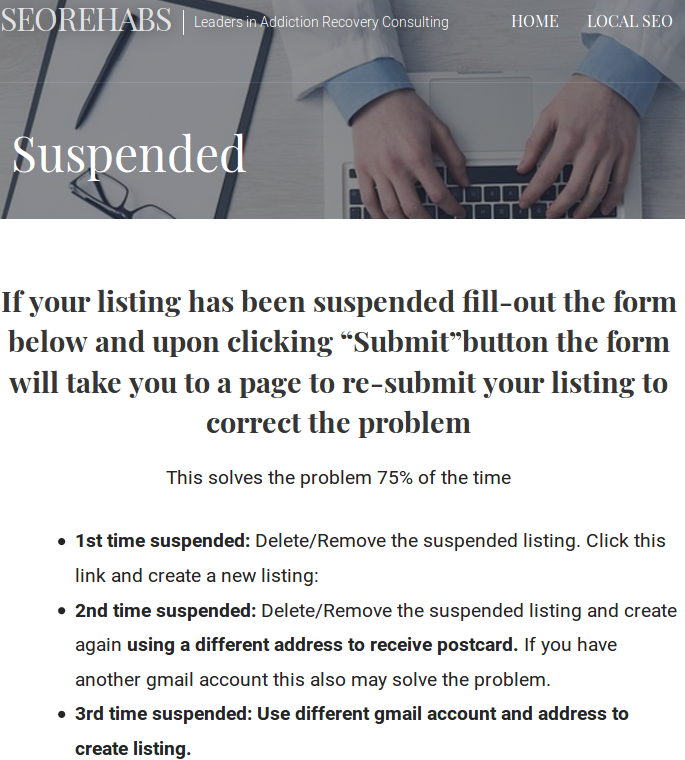
Assistants also can earn extra money writing fake, glowing reviews of the treatment centers:
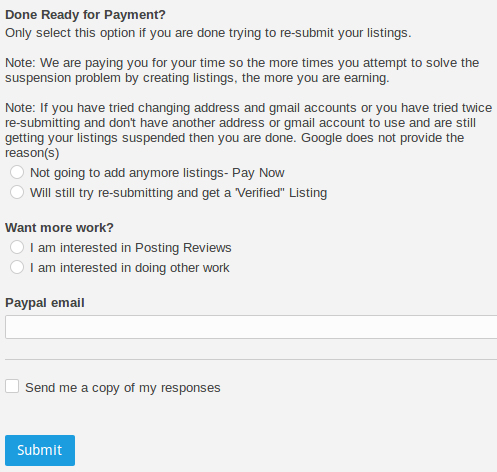
Below are some of the plainly bogus reviews and listings created in the last month that pimp the various treatment center names and Web sites provided by Seorehabs. It is not difficult to find dozens of other examples of people who claim to have been at multiple Seorehab-promoted centers scattered across the country. For example, “Gloria Gonzalez” supposedly has been treated at no fewer than seven Seorehab-marketed detox locations in five states, penning each review just in the last month:
A reviewer using the name “Tedi Spicer” also promoted at least seven separate rehab centers across the United States in the past month. Getting treated at so many far-flung facilities in just the few months that the domains for these supposed rehab centers have been online would be an impressive feat:
Bring up any of the Web sites for these supposed rehab listings and you’ll notice they all include the same boilerplate text and graphic design. Aside from combing listings created by the reviewers paid to promote the sites, we can find other Seorehab listings just by searching the Web for chunks of text on the sites. Doing so reveals a long list (this is likely far from comprehensive) of domain names registered in the past few months that were all created with hidden registration details and registered via Godaddy.
Seely said he spent a few hours this week calling dozens of phone numbers tied to these rehab centers promoted by TopSeek, and created a spreadsheet documenting his work and results here (Google Sheets).
Seely said while he would never advocate such activity, TopSeek’s fake listings could end up costing Mr. Harvey plenty of money if someone figured out a way to either mass-report the listings as fraudulent or automate calls to the handful of hotlines tied to the listings.
“It would kill his business until he changes all the phone numbers tied to these fake listings, but if he had to do that he’d have to pay people to rebuild all the directories that link to these sites,” he said.
WHAT YOU CAN DO ABOUT FAKE ONLINE REVIEWS
Before doing business with a company you found online, don’t just pick the company that comes up at the top of search results on Google or any other search engine. Unfortunately, that generally guarantees little more than the company is good at marketing.
Take the time to research the companies you wish to hire before booking them for jobs or services — especially when it comes to big, expensive, and potentially risky services like drug rehab or moving companies. By the way, if you’re looking for a legitimate rehab facility, you could do worse than to start at rehabs.com, a legitimate rehab search engine.
It’s a good idea to get in the habit of verifying that the organization’s physical address, phone number and Web address shown in the search result match that of the landing page. If the phone numbers are different, use the contact number listed on the linked site.
Take the time to learn about the organization’s reputation online and in social media; if it has none (other than a Google Maps listing with all glowing, 5-star reviews), it’s probably fake. Search the Web for any public records tied to the business’ listed physical address, including articles of incorporation from the local secretary of state office online.
A search of the company’s domain name registration records can give you an idea of how long its Web site has been in business, as well as additional details about the the organization (although the ability to do this may soon be a thing of the past).
Seely said one surefire way to avoid these marketing shell games is to ask a simple question of the person who answers the phone in the online listing.
“Ask anyone on the phone what company they’re with,” Seely said. “Have them tell you, take their information and then call them back. If they aren’t forthcoming about who they are, they’re most likely a scam.”
In 2016, Seely published a book on Amazon about the thriving and insanely lucrative underground business of fake online reviews. He’s agreed to let KrebsOnSecurity republish the entire e-book, which is available for free at this link (PDF).
“This is literally the worst book ever written about Google Maps fraud,” Seely said. “It’s also the best. Is it still a niche if I’m the only one here? The more people who read it, the better.”



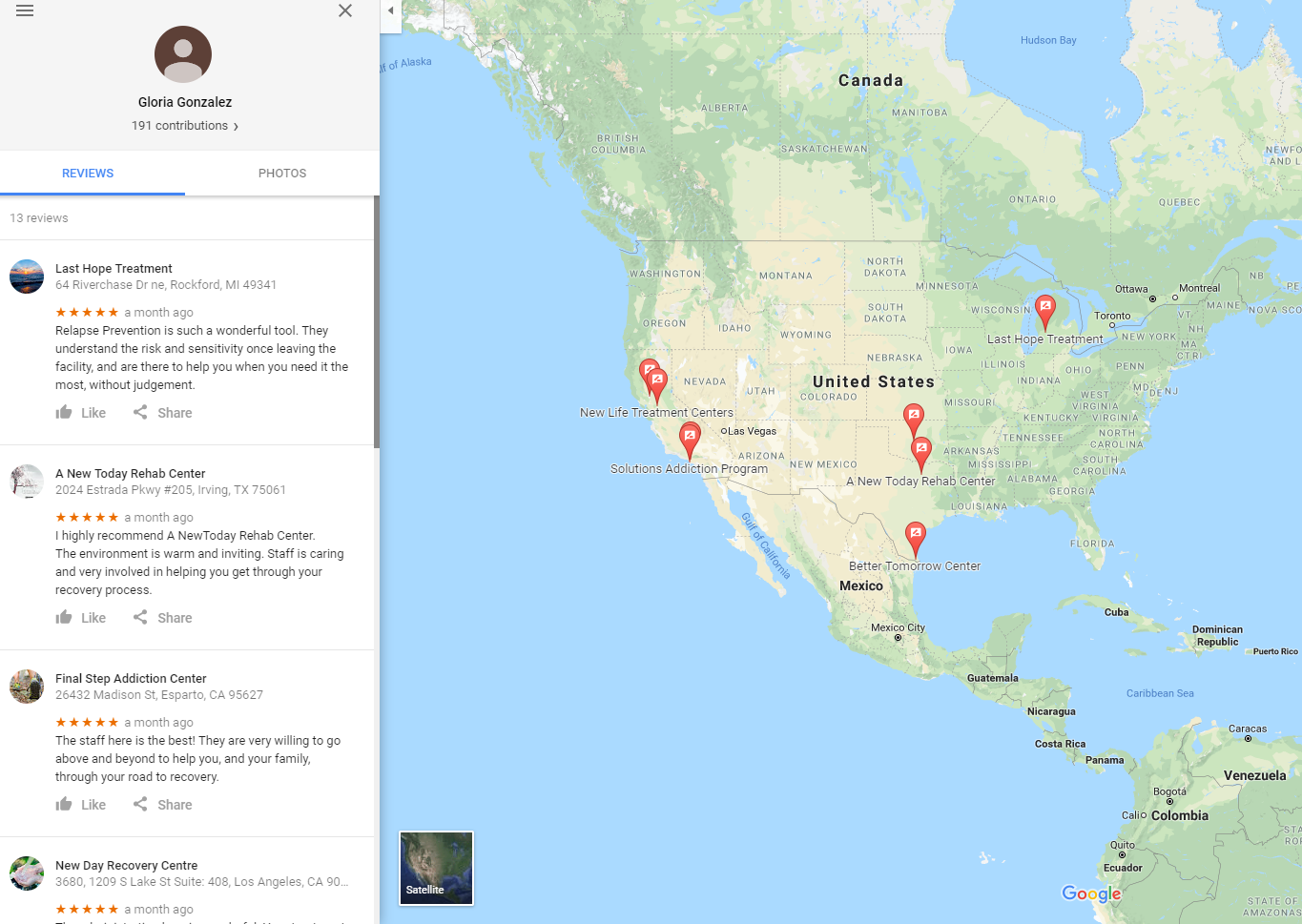
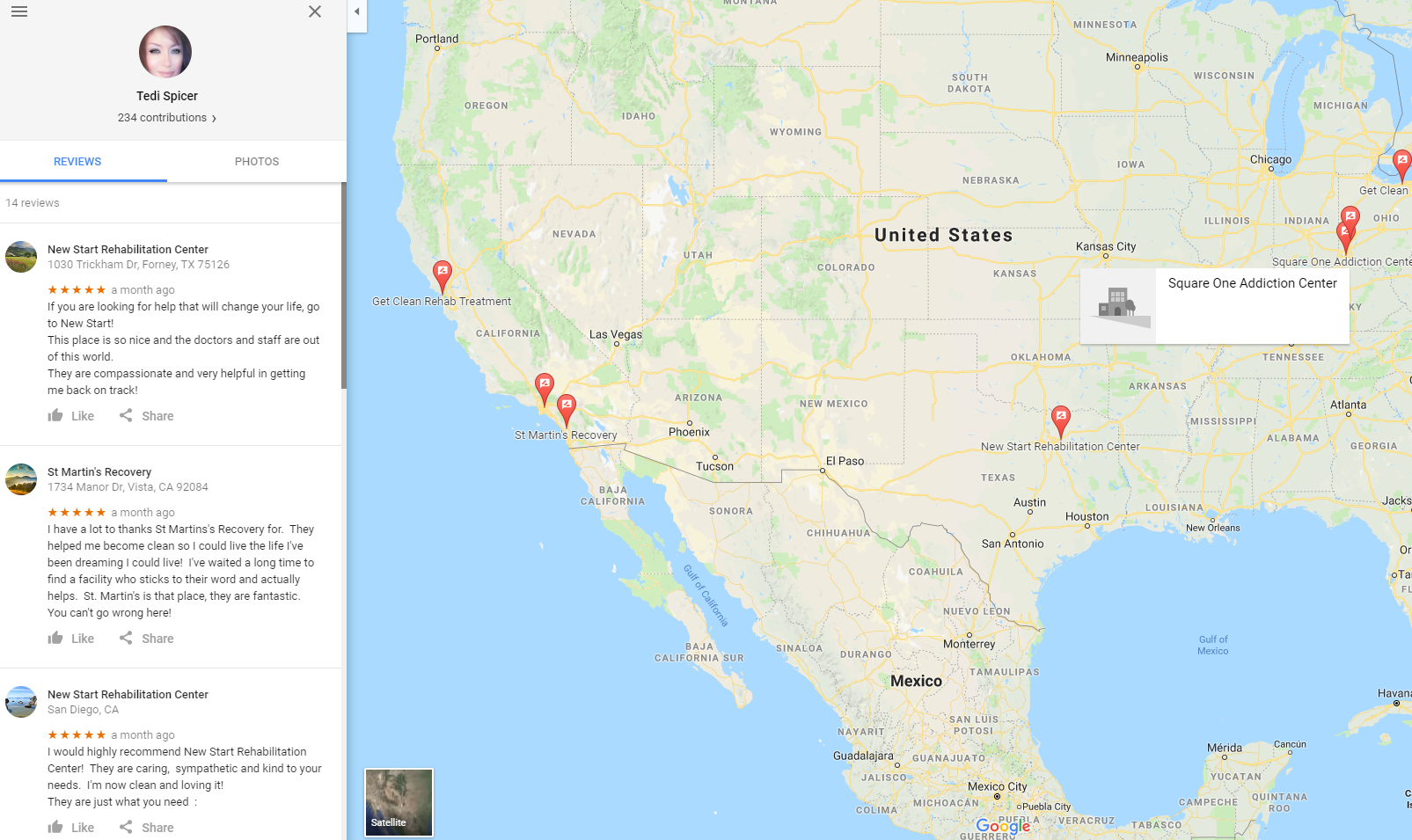

Guess it’s time to write some of our own reviews for these bogus listings?
Interesting article !
Apparently these jerks are branching out to TV. I have seen advertisements for The Addiction Recovery Network locally. I have also seen clowns dressed up as doctors on TV shilling for medical companies pushing Obamacare. One “doctor” name that comes to mind is Dr. Jason Buchwald MD. There are others as well.
Wow! I did a search for that name “Dr. Jason Buchwald MD”, and there is one site or search result after another with absolutely no web reputation. They must all be relatively new links!!
Thanks Chip!
You’re welcome!
you should do a report on something similar except the fake reviews are done to a person usually to smear them..where the only way they can be taken down or hidden is to pay the entity high monthly fees. they never do any kind of verification anything went wrong…….
http://www.ripoffreport.com
There’s a guy named William Stanley who used to do just that. People would hire him for positive fake reviews. When you tried to stop paying him, he would threaten you and say he will post negative reviews about you on various sites, many of which he owned. He’s currently serving 37 months in federal prison for extortion and blackmail.
Krebs did a series on fake reviews.
Here’s part 2, which links to part 1 and a whole discussion on SEO and reputation management:
https://krebsonsecurity.com/2015/10/dont-be-fooled-by-fake-online-reviews-part-ii/
For anyone looking for substance use or mental health treatment, you can also check the Federal Government’s Substance Abuse and Mental Health Services Administraion (SAMHSA) website: https://findtreatment.samhsa.gov/
Providers receiving federal funds who serve low income and indigent clients are listed.
That site also has a green Web-Of-Trust rating – but then any real government service site should – thanks Mike!
I knew this was a big issue with florists. Seely doesn’t mention it in his “best worst book” on the subject, but it was real. Mom-n-Pop florists were getting killed (figuratively) by listings that robbed them of inbound phone orders.
I honestly didn’t know about the floral category problem, but it doesn’t surprise me in the least. Platforms like Google Maps and Bing etc with weak security controls / loopholes etc are breeding grounds for greedy people to take advantage of others.
Yup, good article. But?
Like usual, some bad operator making money, by being a bad operator, and deflecting blame to a ” carrier”. Is it Google’s fault that a bad operator is there? Or bings, or Android, or Apple? Or are their people that will exploit the needy. Or, those who need help. After all, there are people that need help, now.
So-called “reputation” management services do something similar. They run phony forum sites, where they invite you to leave reviews/comments/experiences about a business. And there are LOTS of them. Search for your own doctor…you’d be amazed at how many sites pop up with listings and ratings. I visited and left a bad review on a car dealer rating site, only to be badgered about why I left a bad review. When I didn’t engage them, they sent me a message that the review was being deleted because I wouldn’t validate my reasons for leaving a bad review, and it wasn’t fair to the dealer. As long as they can flood the market with good reviews (making consumers do the review work for free here), and suppress the bad reviews, the customer (of the service, not you) smells like a rose.
I didn’t get your point of mentioning the bad car dealer review you left. If someone can’t respond and explain a bad review, how can anyone tell if it’s valid or not?
Frankly, complaints posted without facts are something I notice, but largely ignore since the true intent of the post is obscured. And I feel much the same about positive comments/reviews that also don’t explain their reasons for posting.
Wow, that’s quite the tag cloud for this post!
So I’ve searched my city and found a half dozen fake listings. They’re usually fairly obvious as they’ve used residential addresses. I call the number planning to ask for their city business license. So far all have been disconnected numbers. For these, I’ve submitted an edit to Google Maps that the business doesn’t exist, and a second edit for a website for the business linking to the June, 2016 Krebs article on fake rehab businesses.
Another issue I’ve found is that Google Maps pages of legitimate businesses having their phone number hijacked and pointed at (844) 221-2276. I’ve also submitted Google Maps edits to return these phone numbers to their legitimate local phone number.
When I called this number, they won’t give straight answers. I wanted to know if they had a location in my local area, they wouldn’t give that. They just kept saying they were a nationwide recovery business and wanted my insurance company. Side note: they showed up on my Caller ID as a legitimate recovery program name, Teen Challenge, so they’ve also managed to trick Google’s phone directory, probably based on their Google Maps mis-information.
Had NO idea the “fake review industry” was this pervasive. Should have known since I can rarely pick up my mobile phone without a spoofed caller ID, look at Facebook and not see obvious fake news (the actual fake news vs. POTUS’ calling anything he doesn’t like fake) and generally have a distrust that I haven’t had since my first days online (Compuserve; The WeLL).
Thanks once again for your exhaustive reporting, Brian.
Another fraud number that has been used to hijack legitimate local businesses and point to a “referral” service: (707) 416-4290
I’ve contacted the legitimate local businesses and passed on this story and how they can “claim” their Google business listing and block further hijackings.
Just out of curiosity, I did a search for rehabs[dot]com and Brian is right – I had to go WAY down the page before I found even one listing that had a green WOT rating. It was called “thefix” and below it was another search result about a huffingtonpost article on a similar subject. I ignored any pinterest, facebook, or twitter links, because they will always show a green rating that is only related to the over all site.
It is a sad state of affairs that people who need help so badly get run aground like this – it is the lowest form of life that promotes this! >:(
To me, the root problem is the market for sales leads. As long as there are businesses (honest or not) that are willing the pay for sales leads, someone will gather and sell those leads – honestly or not.
Great article per usual Brian. Thank you Bryan Seely for the book! I’m really looking forward to reading it.
We have ads that run on local stations, mostly during daytime hours, with a dodgy looking guy in scrubs pushing something called the addiction hotline. The commercials have always rubbed me the wrong way but I couldn’t figure out what the scam was. I’m guessing it’s a similar setup to what you laid out above, except without the fake listings. I assume the method via TV ads is probably at least legal, but still feels like a bait and switch.
This is pretty off-topic, but they amuse me. You’re referring to these, right? (1)
Even without the disclaimer, the phony delivery and ever-changing phone numbers of TAN are a good clue it’s just a call center.
Also just a call center? Joan Lunden’s gauzy pitch for nursing home referrals, with ever-changing phone numbers, too. (2)
The most offensive part of the call center referral scheme is that those seeking help are both customers and commodities to be sold. One call to them establishes a “business relationship,” virtually guaranteeing they’ll be receiving telemarketing and direct-mail offers in perpetuity. Sickening.
1- https://www.ispot.tv/brands/Z2_/the-addiction-network
2 – https://www.ispot.tv/brands/d9K/a-place-for-mom
If you do a DNS lookup on these fake rehab domains listed in the text file, they are very closely tied together in the same CIDR block. It might be worth to do some more investigation using searchengines, DNS and reverse DNS tools to find more of these fake domains, without the need to call these phony numbers.
In addition to fake rehabs and the above-mentioned fake florists, there’s fake locksmiths in every town which are nothing more than referrals to literal thieves with burglary tools. (1)
There’s fake plumbers, too! (2)
What separates the rehabs from the other scams are the reviews, which are customized per Krebs’ article. Still, it’s important for anyone searching any business listing to be aware just how easy it is for illegitimate listings and fake reviews to be created, including for doctors. (3)
Link 1 – https://mobile.nytimes.com/2016/01/31/business/fake-online-locksmiths-may-be-out-to-pick-your-pocket-too.html
Link 2 – http://fortune.com/2017/04/07/google-scammers-maps/
Link 3 – http://www.miamiherald.com/living/health-fitness/plastic-surgery-101/article175369116.html
A fake review for Budget Auto Glass cited by Bryan Seeley on page 176 of “Cyber Fraud: The Web of Lies” can still be found on the Yellow Pages site, poster ‘mamoy’:
https://www.yellowpages.com/san-antonio-tx/mip/budget-auto-glass-inc-466250721
Brian,
Your USA readers may not be aware that each state has an Office or Department of Substance Abuse or Mental Health.
Federally, there is the Substance Abuse and Mental Health Administration, with links and phone numbers to get licensed, legitimate help:
https://www.samhsa.gov/find-help
Sadly, this does not include any quality control. This site may lead you to a legitimate provider. But it can also lead you to Narconon.
A list of government licensed providers is a start and that’s all it should be. If someone wants a recommendation based on their specific needs, they should start with doctors and nurses they already know.
I looked through the SAMHSA.gov resource lists for the 3 largest states: New York, Florida, and California. Largely, it’s MDs, DOs, NPs, hospitals, and county health offices. These are exactly the right starting point for anyone considering rehabilitation and mental health services.
Narconon isn’t on any list. This is unsurprising because Narconon is not licensed. I can’t imagine what you’re referencing, but you’re wrong in that regard.
Incidentally, AA/NA isn’t listed either, as they’re layperson services, not licensed professionals.
I guess we could all place calls to those centers and pretend to seek rehab. Though the call feeder would get lots of $50-$100 commissions, the scammer rehab centers would lose that same amount. We’d only need to spend, what, 5-15 seconds on the call? Better, yet someone with a robocall bot could do it.
Jolly Roger might work. I tried the paid service for awhile but I never scrambled fast enough to receive Jolly Roger’s robot call back when a scammer called so I could merge the calls and let Jolly Roger’s robot handle the call. And it’s unwise to say a single word to a scammer since they might record it for future biometric finance-related authentication.
But… Jolly Roger might work here with these rehab scams.
If anyone here tries it, please post the results. I let my Jolly Roger subscription lapse over a year ago.
This is literally HomeAdviser’s business model.
HomeAdviser and others. I was thinking exactly the same thing. Think I will refrain from venting.
I’m reading that PDF on Cyber Fraud and it’s a winner.
I send you money once a year to help pay for your work and this one article earned your money for 2018. I encourage other readers to get in the habit of annual contributions of $20 to $100 to worthy individuals and organizations that protect our security and privacy. I contribute to ACLU and EFF because they go to court for us. I contribute to Brian Krebs because he works so hard to uncover the truth about the exploitation of our security and privacy. If there was a Kickstarter to clone Brian Krebs, I would contribute to that, too. Sadly, there doesn’t seem to be anyone else with his technical knowledge and journalistic acumen. So send him some coin via Paypal or Patreon. Today.
There is huge money in referring drug addicts to recover centers. The recovery centers are just holding houses sucking up the insurance of the patents until they are dry and then they toss the addicts into the streets.
I have read a number of investigative news reports about this scummy business. Here are links to just a couple.
Targeted by an addiction treatment center, union workers feel trapped as their benefits are drained
https://www.statnews.com/2017/11/10/addiction-treatment-unions/
https://www.npr.org/sections/health-shots/2017/08/10/537882989/beach-town-tries-to-reverse-runaway-growth-of-sober-homes
Mr. Seely might want to update his book. The footnote on page 10 says:
“I would give you a list of recent political blunders, but this book was written during the presidential campaign of Donald Trump, which renders the list too long and elastic to even try to encapsulate. Yes, future generations, Donald Trump once ran for president.”
Thanks to Bryan for sharing his work!
The Church of Scientology has it’s hands in many businesses including Information Security Technology. They run call center sweat shops churning young people like robots. I would bet they are using these ratings services for these businesses as well. Without mentioning names, one is an online security training company based in Clearwater Florida. If you never saw the CoS palace, here is a link to Clearwater headquarters. http://www.tampabay.com/news/scientology/Clearwater-City-Council-candidates-mum-on-Scientology-s-impact-downtown_165446347
Please name the names that you know and have proof that are running scams. It is only when you name the names on the internet can those scammers be found by targets trying to do research before becoming victims.
I have no problem naming DreamHost and their abuse staff as being participants in a fake Staffing Company scam. I warned them and provided the many links showing the scammer has set up multiple fake staffing companies and convincing targets to give up their DOBs and SSNs. I pointed out that no legitamate enterprise would have thirty plus web sites with all identical information with the exception of the company name and HR Director. All other executive’s names are same. The DreamHost abuse staff hide behind the technicality of “not being a Tier of Truth” as justification to leave the multiple sites up that they are hosting. I provided the same facts to three other hosting companies and they took down the scammer’s web sites.
I built a Blogger web site to expose the criminal enterprise and have gotten comments from individuals that were able to search for the fake names that the scammer used. They were able to then not respond or in a few cases stop respond to the scammer before they were convinced to give up their DOBs and SSNs.
http://fakestaffing.blogspot.com/
Brian did an article about fake locksmith listings on Google Earth/Maps a year or two ago. I was inspired to check for same in my immediate area, and I found one in G.E. The icon fell on a building that I knew had been the local post office since the 1920’s and housed nothing but the post office. Opening the icon produced the name of the locksmith business; a small photo of the p.o. taken from the alley across the street (cutting off everything but the entrance); a street address with a number, and “suite” number (likely a p.o. box number?). Phone books did not list any locksmith business with the same name.
So now I see this article informing me that the miscreants are still in play. I check G.E. for locksmiths as before, and an icon appears, again on the local p.o. The name of the business, and the photo, are different from before. The phone books for this, and surrounding, counties do not list a locksmith by the name advertised in the photo, and the photo is poor quality and is taken from one side of the entrance (read: “can’t see much”). The phone number is local. And the sign for the business (about half of it cut off in the photo) reads “Procare Physi”.
I expanded the search area in G.E. beyond my town and started typing “Procar”. G.E. offered “Procare Physical Therapy” among several. I selected that and did a search. I was taken to a town 25 miles away, in the adjoining state (so much for that “local phone number”). G.E. misplaced the icon for the business, but I located Procare in a strip mall further up the road.
I think it’s interesting, in light of the several posts (above) giving heads-up re: fake physical therapy “businesses”.
Scammers have a long history of using PO boxes as well as UPS storefronts. The new tactic that is being used by fake (or India based) employment companies is to use rent-by-the hour offices with reputable addresses. I have found that many are managed by the “Regus Management Group” in many of the largest US cities.
It has become nearly impossible to discern the fake from the off-shore.
That is one dangerous cult.
I get cold calls at work now and then (robocall, then human) asking about substance abuse treatment for “you or a loved one.” I wonder if Scientology is somewhere behind those, too.
wrote about a dozen bad reviews to counterbalance Gloria. very unfortunate about all the scams surrounding recovery centers. The Orange County Register has been doing dozens of pieces on the abuse.
There is a very good article on the Repwarrior.com website about how to manage your own online reputation. This article presents a clear strategy and path to success if you want to manage your own reputation. You can find the article on Repwarrior’s website; repwarrior.com/how-to-manage-your-own-online-reputation/.
I ended up hiring them anyways, and they did a great job. For those of you who have more time than money, this article will help you manage your reputation online.